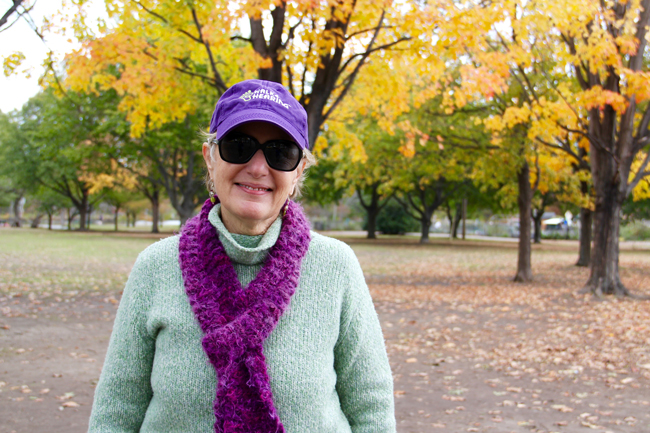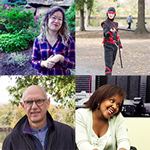Faces Behind the Screen: Peggy
Quick Links
<< Return to all “Faces Behind the Screen” stories
When people experience hearing loss for the first time in their lives it can manifest in a deep, personal crisis. But some people learn how to take it in stride and make it their life mission to help others who are going through the same thing.
One of those people is speech and language pathologist, Peggy Ellertsen, who we spoke with at HLAA’s New England Walk4Hearing 5k event last Fall.
Peggy has a very vivid memory of her initial struggle with hearing loss, which was first identified in the spring of her senior year in college, a few months before she was to graduate with a Bachelor’s Degree in speech pathology.
When did you start developing hearing loss?
It wasn’t identified until I was graduating from college. My department head had gotten a grant for installation of an audiology clinic in our campus speech and hearing center. He asked graduating seniors to volunteer to have him evaluate our hearing so that he could work with the diagnostic equipment. When he assessed my hearing, he discovered a mild, sensori-neural hearing loss. It was the first time that I had any inkling that my hearing acuity was not within normal limits.
How did you react once you found out what was happening to your hearing
It was a crisis, because my mother, at that point, had lost almost all of her hearing and had become overwhelmed by hearing difficulties. She had become very dependent on my father, and she experienced chronic exhaustion posed by the listening demands of her condition.
Growing up as a witness to her struggle was very painful, and when I realized that I too might have the same type of hearing loss, I was very concerned.
…In my mother’s day, I think that much of her withdrawal was because she just was so overwhelmed by the loss of ability to easily and spontaneously participate in conversation — and by the stigma that results from that.
“I didn’t know anyone my age who had hearing loss. I felt very isolated…”
So, what did you do next?
I got hearing aids right away. And I really hated them. I didn’t like the way they felt, and I didn’t like the way sound… sounded. However good my aided speech comprehension was when measured in the audiology booth, when I was in the real world, the hearing aids were a source of tremendous stress and actually impeded communication. So, like many people who are on their first round of hearing aids, after a summer of trying, I put them in the drawer — where they would remain until I was in my mid-30s — and I got ready to move to Boston for graduate school.
“I couldn’t really go to the movies anymore and fully get the jokes. I felt things slipping away from me.”
I didn’t know anyone my age who had hearing loss. I felt very isolated in the knowledge that I likely carried a genetic hearing loss legacy, as my grandfather also had severe hearing loss. But because the only treatment offered at that time was hearing aids, I pretty much kept my worries to myself and followed through with my career plans.
How did your hearing loss progress over time and how did you cope with it?
When I started working, one of my functions as an elementary school speech and language therapist was to screen the hearing of second grade children. With access to a portable audiometer, I was able to monitor my own hearing thresholds with occasional rudimentary self-screenings — something that become somewhat of a preoccupation.
I couldn’t really go to the movies anymore and fully get the jokes. I felt things slipping away from me. …It was around that time that I began to actively disclose to clients, friends and extended family members that I had a hearing loss, and I discovered HLAA — a real game changer.
“I burst into tears. I was thinking about my mother, and how this is what she needed… what would have made her life so much better.”
Was that a big hurdle for you?
By then I had sort of become a little more comfortable in my own skin about [my hearing loss]. Sam Trychin, one of the many resources that I’ve acquired through HLAA, has always said that what we have to do is get comfortable with our own hearing loss before we can expect anyone else to accept it. So, I think I had sort of achieved that at this point.
What was it like when you first discovered HLAA?
I’ll never forget it. I walked into the [convention] with my bags… and there were hundreds of people with hearing loss, talking to each other, and reading their programs, and planning their schedules, and which seminars were they going to go to. And I burst into tears. I was thinking about my mother, and how this is what she needed… what would have made her life so much better. And I knew that, for myself, it was going to be OK. I’ve got this.
—
Peggy has been heavily involved with HLAA. She developed a speaker series for HLAA’s Boston chapter, and for four years was webmaster of the chapter’s award winning website. She is currently an elected member of HLAA’s Board of Trustees, serves on HLAA’s Get in the Hearing Loop Task Force, and this year is co-chair for the New England Walk4Hearing.
Peggy also works closely with communities and businesses to make the world more accessible and enjoyable to people who are hard of hearing. Lately, she’s been working with theaters and other entertainment venues in the Boston metro area to help them implement assistive listening systems that allow most people with hearing aids and cochlear implants to hear stage or screen audio.
For more inspiring stories and perspectives from people we met at the New England Walk4Hearing see our interviews with Kevin, Sandy, and Stu.
NOTE: This page was originally published on 6/23/2017 and was updated 1/16/2018.
A huge ‘thank you’ to the Hearing Loss Association of America (HLAA) for hosting this series of interviews at the New England Walk4Hearing in Fall of 2016.
Faces Behind the Screen is a storytelling project focusing on members of the Deaf and hard of hearing community.





